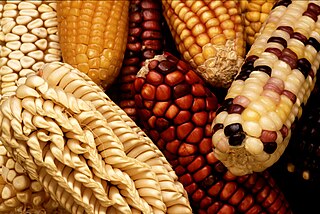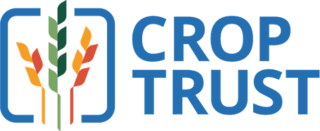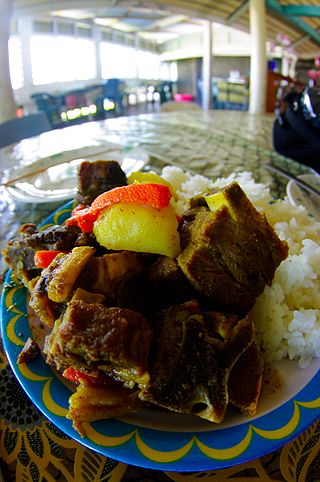Related Research Articles

A seed bank stores seeds to preserve genetic diversity; hence it is a type of gene bank. There are many reasons to store seeds. One is to preserve the genes that plant breeders need to increase yield, disease resistance, drought tolerance, nutritional quality, taste, etc. of crops. Another is to forestall loss of genetic diversity in rare or imperiled plant species in an effort to conserve biodiversity ex situ. Many plants that were used centuries ago by humans are used less frequently now; seed banks offer a way to preserve that historical and cultural value. Collections of seeds stored at constant low temperature and low moisture are guarded against loss of genetic resources that are otherwise maintained in situ or in field collections. These alternative "living" collections can be damaged by natural disasters, outbreaks of disease, or war. Seed banks are considered seed libraries, containing valuable information about evolved strategies to combat plant stress, and can be used to create genetically modified versions of existing seeds. The work of seed banks often span decades and even centuries. Most seed banks are publicly funded and seeds are usually available for research that benefits the public.
The International Treaty on Plant Genetic Resources for Food and Agriculture is a comprehensive international agreement in harmony with the Convention on Biological Diversity, which aims at guaranteeing food security through the conservation, exchange and sustainable use of the world's plant genetic resources for food and agriculture (PGRFA), the fair and equitable benefit sharing arising from its use, as well as the recognition of farmers' rights. It was signed in 2001 in Madrid, and entered into force on 29 June 2004.

The Pacific Community (PC), formerly the South Pacific Commission (SPC), is an international development organisation governed by 27 members, including 22 Pacific island countries and territories around the Pacific Ocean. The organisation's headquarters are in Nouméa, New Caledonia, and it has regional offices in Suva, Pohnpei, and Port Vila, as well as field staff in other locations in the Pacific. Its working languages are English and French. It primarily provides technical and scientific advice, and acts as a conduit for funding of development projects from donor nations. Unlike the slightly smaller Pacific Islands Forum, PaciCom is not a trade bloc, and does not deal with military or security issues.

Agricultural biodiversity or agrobiodiversity is a subset of general biodiversity pertaining to agriculture. It can be defined as "the variety and variability of animals, plants and micro-organisms at the genetic, species and ecosystem levels that sustain the ecosystem structures, functions and processes in and around production systems, and that provide food and non-food agricultural products.” It is managed by farmers, pastoralists, fishers and forest dwellers, agrobiodiversity provides stability, adaptability and resilience and constitutes a key element of the livelihood strategies of rural communities throughout the world. Agrobiodiversity is central to sustainable food systems and sustainable diets. The use of agricultural biodiversity can contribute to food security, nutrition security, and livelihood security, and it is critical for climate adaptation and climate mitigation.

Taro is a root vegetable. It is the most widely cultivated species of several plants in the family Araceae that are used as vegetables for their corms, leaves, stems and petioles. Taro corms are a food staple in African, Oceanic, East Asian, Southeast Asian and South Asian cultures. Taro is believed to be one of the earliest cultivated plants.

A gene bank is a type of biorepository that is designed around the preservation of genetic information. Gene banks are often used for storing the genetic material of species that are endangered or close to extinction. They are also used for the preservation of major crop species and cultivars, in order to preserve crop diversity.

The Crop Trust, officially known as the Global Crop Diversity Trust, is an international nonprofit organization with a secretariat in Bonn, Germany. Its mission is to conserve and make available the world's crop diversity for food security.
Crop diversity or crop biodiversity is the variety and variability of crops, plants used in agriculture, including their genetic and phenotypic characteristics. It is a subset of a specific element of agricultural biodiversity. Over the past 50 years, there has been a major decline in two components of crop diversity; genetic diversity within each crop and the number of species commonly grown.

Malgova' or Malgoa is an important mango cultivar mainly grown in Tamilnadu, Kerala and Karnataka and also in other parts of South India. It is a large round fruit, it has a small hard seed inside and is very juicy and fragrant. It is generally considered to be one of the best mangoes. Its production area is centred on the districts of Salem, Dharmapuri and Krishnagiri in Tamil Nadu, Gujarat, as well as neighbouring parts of Andhra Pradesh and Karnataka.

The cuisine of Tuvalu, a state in the Central Pacific (Oceania), is based on the staple of coconut and the many species of fish found in the ocean and the lagoons of the atolls of Tuvalu. Pulaka,, or swamp taro, is an important source of carbohydrates. Rice now forms an important part of the diet. Coconut is used in different forms with coconut water, coconut milk and the flesh of the coconut being used to flavour dishes. Various desserts made on the islands include coconut and coconut milk, instead of animal milk.
Kerevat is a town and seat of Gazelle District in East New Britain Province, on the island of New Britain, Papua New Guinea. It is home to a prison, the Kerevat National High School, the Kerevat Education Centre, and the Cocoa and Coconut Research Institute. Its principal crop is cocoa. An airfield was constructed here by the Imperial Japanese in World War II during September 1943.
The Pacific Community's Centre for Pacific Crops and Trees (CePaCT), formerly known as the Regional Germplasm Centre (RGC), is a propagation material vault operated by the Pacific Community (SPC)'s Land Resources Division. Its purpose is to preserve resources including crops, and other plants of the Pacific region. The vault is in Fiji, and it replaced many local seed vaults of the Pacific that had trouble with maintenance.
Agriculture in Tuvalu is based on coconut and swamp taro, , which is similar to taro but "with bigger leaves and larger, coarser roots"; taro is also cultivated in Tuvalu.
John Trevor Williams was a British plant geneticist who was instrumental in the creation of plant gene banks.
The Seed Savers' Network (SSN) is an Australian not-for-profit organisation, based in Byron Bay, New South Wales. Since 1986, SSN has organised gardeners and farmers to collect, multiply and redistribute garden seeds in Australia and also within peasant organisations worldwide.

International Center for Biosaline Agriculture (ICBA) is an international, not-for-profit applied agricultural research center with a unique focus on marginal environments. It identifies, tests and introduces resource-efficient, climate-smart crops and technologies that are best suited to different regions affected by salinity, water scarcity and drought. Through its work, ICBA aims to improve food security, nutrition and livelihoods of resource-poor farming communities around the world.

One of the major human migration events was the maritime settlement of the islands of the Indo-Pacific by the Austronesian peoples, believed to have started from at least 5,500 to 4,000 BP. These migrations were accompanied by a set of domesticated, semi-domesticated, and commensal plants and animals transported via outrigger ships and catamarans that enabled early Austronesians to thrive in the islands of Maritime Southeast Asia, Near Oceania (Melanesia), Remote Oceania, Madagascar, and the Comoros Islands.

Laura Boykin Okalebo is an American computational biologist who uses supercomputing and genomics to help farmers in Sub-Saharan Africa. She has studied the evolution of the agricultural pest whitefly and identified genetic differences between various species. She works with African scientists to develop computing and genomics skills across the continent, and is a Senior TED fellow.
References
- 1 2 3 4 "Valerie Saena Tuia". Pacific Community. 2017-09-20. Retrieved 2018-07-11.
- 1 2 3 "Vulnerability of Pacific crops addressed by CePaCT". pacific.scoop.co.nz. July 31, 2012. Retrieved 2018-07-11.
- ↑ "Valerie TUIA Publications". ResearchGate. Retrieved 2020-04-17.
- ↑ Boef, Walter de., ed. (2013). Community biodiversity management : promoting resilience and the conservation of plant genetic resources (1st ed.). Abingdon: Routledge. ISBN 978-1-136-47487-3.